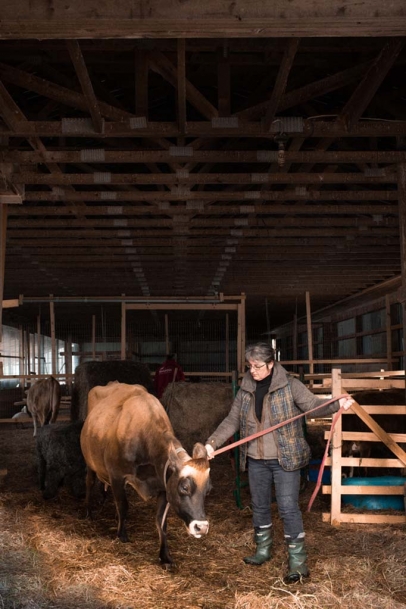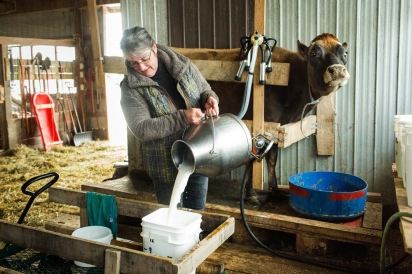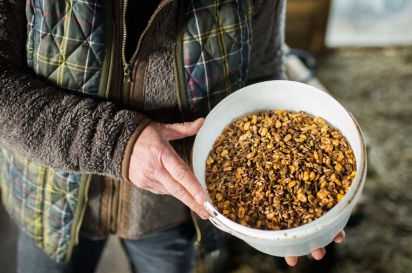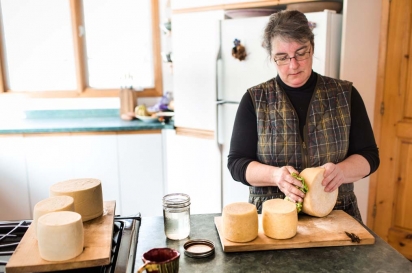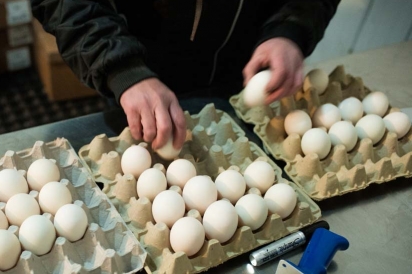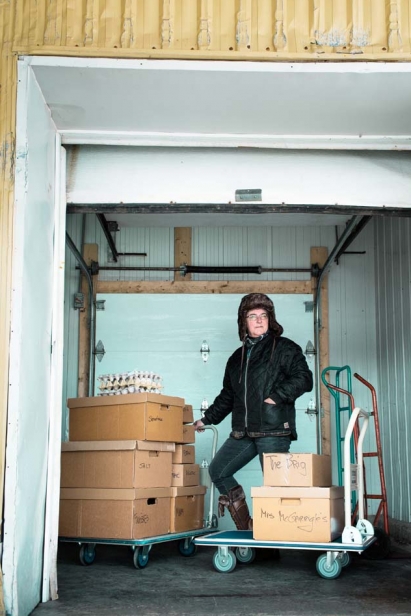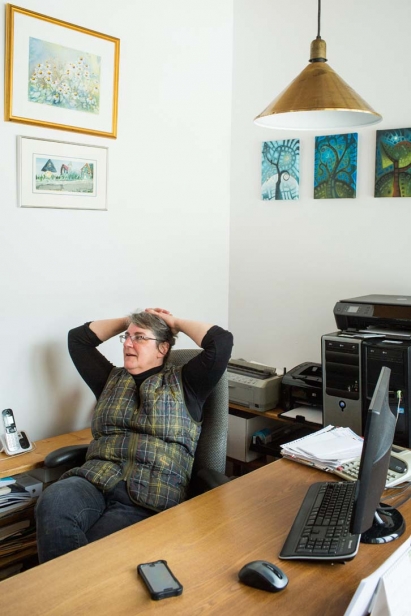Working for Food: Suzanne Lavoie, Mariposa Farm
Suzanne Lavoie always gets a laugh when she thinks of the time her daughter told her she needed yoga. “She said, “Mom, you are so stressed. You should really come to a class with me." While a downtown yoga studio filled with spandex-clad yogis did not strike her as particularly grounding, Lavoie understood her daughter’s well-intended, although misguided, concerns. “Of course, I was busy," Lavoie admits, “but what was I going to do? Get up and get myself ready and drive into the city just to relax?”
Despite her incredulity, it is not hard to see why Lavoie’s daughter thought her mom could use a break. As the manager of Mariposa Farm, a small but intensive 100-acre operation less than an hour east of Ottawa, Lavoie certainly has a hectic lifestyle. “You wake up with a list of 10 things you would like to do. By the end of the day you may have crossed off two things and added six more,” she says.
Lavoie is responsible for the fluctuating workforce of farm interns and staff who keep the business of Mariposa, which she has overseen since the late nineties with her partner, Ian Walker, running smoothly. She manages Mariposa’s 60-seat restaurant, the Pavillion, which hosts dozens of weddings and conferences annually and serves up a three-course lunch every Sunday. After she has co-ordinated the onslaught of reservations for the popular brunch service, a true farm-to-table experience that offers stunning panoramic views of the farm’s idyllic landscape (and a charming Walker as maître d'), Lavoie can be found manning the grill in her chef whites, a position she has held since the Pavillion’s inception 16 years ago.
Needless to say, Lavoie is busy. “You never know which staff will call in sick, which piece of machinery will break down,” she concedes, “But I like that. I like the constant flow.”
For Lavoie, Mariposa is much more than a business: it is a way of life, a vision she shares with Walker. It's one that is founded upon the principles of caring for what is most important — the land, people and animals who rely on them. “People have so much and they are so stressed,” Lavoie points out, “They want more than the basics and forget to take care of what they have.”
“They have become human doings instead of human beings.”
Nurturing a healthy, local food system is at the heart of Mariposa, a diverse farm business that has thrived due to Lavoie and Walker’s fierce commitment to sustainable agriculture. “You have to have the numbers, but first you need the passion,” she insists, “You have to listen and you have to learn. Then you have to share. And you have to work.”
It was this shared passion, and their complementary abilities, that brought the two together. They met at Alfred College, the (nowclosed) agricultural branch of the University of Guelph, a fivehour drive from the Mariposa property Walker had owned since he was 19. At college, Walker had specialized in horticultural studies; Lavoie, animal sciences. After graduation, she stayed on campus, teaching beekeeping and sheep reproduction before moving into a position as a project manager.
“I had a great job. I was making $80K, I had six weeks off. I was travelling.” Meanwhile, Lavoie and Walker worked on Mariposa as much as they could, quickly discovering their combined potential as farmers. “Ian is a gardener. He needs the animals so he can have the manure for his gardens.” With Lavoie tending the animals, Mariposa was soon in business, first as a duck and goose supplier, then as a wholesaler for farm products bestowed with the Mariposa seal of approval, with the restaurant business not far behind. By 2002, Lavoie decided to leave her full-time post of 19 years to commit to Walker (who had given up off-farm work two years prior) and their shared vision of Mariposa. “I have always said, if you are paddling in a canoe and you both paddle on one side, you are not going to get very far.”
While Walker paddles along in his gardens, Lavoie leads the charge for the core of the Mariposa Farm operation: a service-driven distribution business that matches local farm goods to the 130 or so chefs who rely on Mariposa for their exceptional product lists. She works mostly from her office in the farmhouse (“the most beautiful office in the world!”) and from her warehouse: a small, featureless building, not far from the farm, that houses some of the best foodstuffs the region has to offer.
“Ian has his greenhouse. I have my warehouse,” says Lavoie of the space that was once an old abattoir. Now it is home to cartons of duck eggs, wheels of Riopelle, bags of locally grown lentils and jugs of grassy canola oil, all of which meet Mariposa’s strict criteria — “it must be local, fair and ethical for everyone involved.” The Mariposa List is especially beloved for its exemplar cheese selection, expertly curated by Lavoie, for whom cheese is a true labour of love. “I love, love, love cheese!” Lavoie’s rich Franco-Ontarian accent relays her passion in a way only the French seem to muster. While scouring the region for the best cheesemakers, Lavoie realized that selling cheese wouldn’t be enough. “I have a science brain. I needed to know more!” She enrolled in a cheese course at Glengarry where her passion gave way to determination.
“That was it. I came home and said, “Ian, I need a cow.”
A few months later, Walker came home with a surprise: an eightweek- old, bright-eyed Jersey cow and a bull calf — “because he knows I don’t like animals to be alone” — and she was immediately smitten. “We had to wait 15 months to breed her so we would go for walks. She would follow me around, like a dog.” Once Lavoie started milking her, she was committed. “It is everyday,” she acknowledges, “I cannot leave.” It was yet another demand on an already demanding schedule, but for Lavoie, milking was a way for her to connect to the essence of her vision. A way she could feel grounded and just be.
Lavoie had the perfect name for her beloved pet: Yoga.
Now fully grown at 5 years, Yoga is met every morning by a smiling Lavoie who always takes the time to give her doting pet a good scratch. “You have to give,” says Lavoie, as she gives Yoga her breakfast: a pail of spent beer grains from local brewpub, The Clocktower, keeping with the model of sharing and sustainability. “If you don’t give, you won’t receive.” Not long after, Lavoie is carting a pail of fresh, buttery milk into the main farmhouse.
“This is my lab,” she says, walking into her sun-drenched farmhouse kitchen where she turns the lush liquid into sublime blocks of butter, silky yoghurts and wheels of cheddar, gouda and camembert. Given that a typical Jersey produces upwards of 15 to 20 litres of milk daily for nine months of the year, Lavoie has the resources to experiment and learn. “Right now, I am trying apple cider vinegar as a wash for cheddar,” she says. Jerseys also produce milk that is richer in butterfat than that of a Holstein, the iconic black and white cows that make up 94 per cent of Ontario’s dairy herd (Jerseys make up only four per cent.) Their milk is rich in fat and protein, making it the perfect milk for cheesemaking.
Lavoie’s dairy savvy even landed her an invitation to the amateur cheesemaking competition in Picton in 2015, where she took home the prize for best blue cheese. The award was an incredible honour for Lavoie, but also a reminder of the bizarre irony of the dairy industry.
“In Ontario — big is beautiful,” says Lavoie, who is restricted by the province’s dairy regulations from selling her cheeses to the public. “They say I need all of this equipment for the safety of my milk, but these rules only exist because of the risks of a large herd.” Lavoie would have to go thousands, if not millions, of dollars in debt just to set up the infrastructure upon which regulators insist for product safety. Lavoie just shakes her head. “It’s really insulting,” she says, “I’m a professional. Farmers are professionals. You think I want my customers to get sick?”
According to Lavoie, even if she could afford a new fleet of buildings and trucks and secure the elusive quota, it would be up to the cheesemaking community to make room for her in an intensely competitive marketplace. “I couldn’t do a cheddar, since St. Albert does that, I couldn’t do a gouda, because Glengarry does that.” Lavoie isn’t asking for a full obliteration of the supply-management system, just space for farmers like her who want to remain smallscale and need to add value to their farm business. “[The dairy board] needs to adapt to the reality of local food.”
In the meantime, Lavoie continues to nurture the vision of the farm, with no expectations of the future, content in her role as manager and caretaker. “When you do what you like, it is so perfect, so beautiful. And then you say, “Okay, I want to share that.”
For Lavoie, the ultimate fulfillment would be to share her cheese and dairy with the local food market that lies just beyond the farm gate, but for now she will keep going to Yoga. “Waking up in the morning, having a coffee and milking Yoga, that is being a human being,” she says, “Not doing. Just being.”
Mariposa Farm
6468 County Rd. 17, Plantagenet, Ont.
mariposa-duck.on.ca, 613.673.5881


